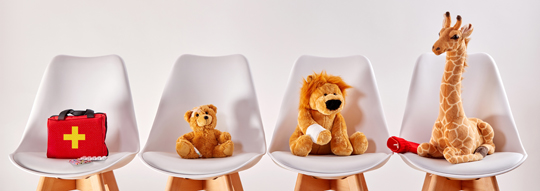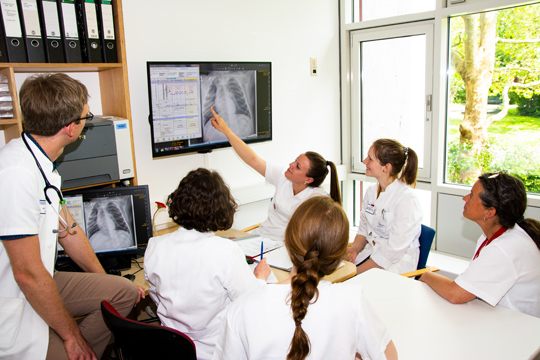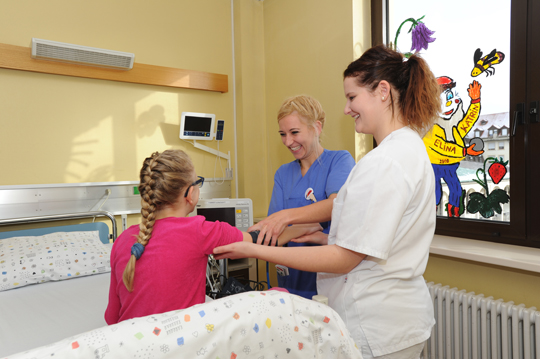Learning from, with, and about each Other
Freiburg, Jul 30, 2019
Medical students and trainees in healthcare and nursing learn together in a joint training ward at the Medical Center – University of Freiburg. This helps them to better understand each other and their respective responsibilities and strengths later on in their career, thus enabling them to provide their patients the best possible care.
 At the Medical Center – University of Freiburg, medical students and healthcare and nursing trainees learn together in a common training ward – so they can better understand each other and their respective responsibilities and strengths.
At the Medical Center – University of Freiburg, medical students and healthcare and nursing trainees learn together in a common training ward – so they can better understand each other and their respective responsibilities and strengths.
Photo: exclusive-design/stock.adobe.com
The idea of joint practical training makes such good sense that one might think it would be the rule, but it is by no means common to offer such an option. On the contrary: the Freiburg project IPAPÄD – “Interprofessionelle Ausbildungsstation in der Pädiatrie” (“Interprofessional Training Ward in Pediatrics”) is the first of its kind in Germany. The project was launched in 2017 as a collaboration between the Center for Pediatrics at the Medical Center – University of Freiburg and St. Joseph’s Hospital in Freiburg. “We had an extremely positive launch,” says Dr. Sebastian Bode. “We’ve received a great response nationwide.” The pediatrician heads the project together with the social scientist Christine Straub. Straub is also a trained nurse and coordinates the nursing and medical side of the project. “The concept is innovative and involved a lot of preliminary work,” she says. Thanks to this effort, IPAPÄD managed to secure funding from the Robert Bosch Stiftung program “Operation Team – Interprofessional Learning for the Health Care Professions.” The project was awarded the Prize for Outstanding Teaching from Frieburg’s Faculty of Medicine in 2018 and has also received the University of Freiburg’s Instructional Development Award.
The concept of IPAPÄD involves an interprofessional team caring for up to six patients in a ward at the Center for Pediatrics or at St. Joseph’s Hospital. The team is composed of two medical students in the final year of their studies, also known as their practical year, and two to four pediatric healthcare and nursing trainees in the second or third year of their vocational training. The trainee doctors work a regular day shift from 8 a.m. to 5 p.m., and the trainee nurses are split up into two groups working day and night shifts.
Mutual Feedback
“Most of the children at the ward have general pediatric conditions,” says Straub – the IPAPÄD team does not treat any special or complex cases, because the main focus of the project is on practicing day-to-day cooperation in the ward, not teaching specialized knowledge. “For the course of these two weeks, the students and trainees are responsible for their patients,” emphasizes Straub: “They can and must take on responsibility for the children,” even though there are of course trained doctors and nurses on hand just in case, “as an airbag,” as she says.
All the steps of the team’s work are discussed immediately afterwards – both among the learners themselves and with so-called learning facilitators, medical assistants and nurses at the ward who have been trained for this task. “And each afternoon we set aside half an hour to reflect together on what is going well, where we see potential for improvement, and what needs to be done the next day,” says Straub. Either she herself or her colleague Bode always attend these meetings. The continuous mutual feedback is one of the core elements of IPAPÄD, she says – precisely because it’s often neglected in the daily routine at the ward.

Communication is of the essence: Following the examination of the patient, the students and trainees meet to discuss plans concerning diagnostics, nursing care, and therapy as well as the responsibilities in the team. Photo: Medical Center – University of Freiburg
Daily Work with Patients
To illustrate what this learning “from, with, and about each other,” as Bode calls it, at the interprofessional training ward involves, he and his colleagues provide the example of a two-year-old boy lying in the hospital with obstructive bronchitis: When the morning shift begins, the nursing trainees from the night shift sit down together with the students from her team, take a look at the patient’s vital parameters, like respiratory rate and blood pressure, as well as what medications he has been given over the night, and the nursing trainees report on what the young patient’s night was like.
Then they all pay a visit to the patient in his room and monitor his breathing, and the medical students listen to the sounds from his chest. “Giving physical examinations is a core skill for doctors,” says Bode. But in the interprofessional team, the nursing trainees then also have the chance to take the stethoscope into their hands and check the child’s breathing, “to experience this actively,” explains Straub. The point is not to mix up the various areas of responsibility but to convey an understanding of what practitioners of the other profession do and when, how, and why they do it.
If the child still has difficulty breathing, the medical students might advise the nursing trainees to give him an inhalation upon consulting the medical learning facilitator – but unlike doctors in their usual routines, they remain in the room while the future nurses administer the inhalation. “This helps me, as a doctor, to learn all that I need to know in practice,” says Bode, particularly as the sick toddler will not necessarily be cooperative and his understandably nervous parents might ask a lot of questions. “This, too, is a part of the shared experience: deciding who should calm down the child, who should explain what to the parents and how,” explains Straub. After all, the idea is for the team members to take on joint responsibility for the patient. Consequently, they listen to the sounds from the patient’s chest again together after administering the inhalation to gain an impression of how quickly and successfully it took effect.
Dependable and Independent
“As soon as the examination is finished and the team members have left the room, they give each other feedback on their work: How was the communication? Who performed what activities and why?” says Straub. This feedback becomes a kind of routine by the end of the two weeks of training – and leads to a noticeable change. “The participants give each other a sense of security and are truly dependable and independent in caring for the patient,” says Bode. Doctors and nurses supervising the interprofessional team intervene as seldom as possible. “We stand in the background with our hands behind our backs, so to speak,” says Bode. “That wasn’t so easy for us in the beginning.”

The teams receive plenty of time for treatment and consultations.
Photo: Medical Center – University of Freiburg
The interprofessional learning objectives IPAPÄD aims to achieve also include meetings following the examination of the patient to plan diagnostics, nursing care, and therapy as well as to reach an understanding of the respective roles, areas of expertise, and responsibilities in the team. It’s probably no accident that the project was initiated in pediatrics, believes Bode, because “pediatrics is a very communicative field.” The two project heads were able to draw on the experience they have gained since 2013 offering interprofessional courses at the University of Freiburg for students of medicine, psychology, and nursing sciences as well as at Freiburg’s Catholic and Protestant Universities of Applied Sciences for students of social work and childhood pedagogy.
Satisfied Patients and Parents
At the moment, Straub is overseeing the transfer of IPAPÄD to a ward for premature and newborn infants at the München Klinik Schwabing in cooperation with the Medical Education Center of the Technical University of Munich. In addition, there are plans to make IPAPÄD an integral part of pediatric training at the Medical Center – University of Freiburg. Capacities are not yet sufficient to accommodate all students and trainees interested in participating in the project, but the support and interest of the medical center management has been great, report both Straub and Bode.
There has also been a lot of positive feedback: “The IPAPÄD team speaks a lot more with patients and their parents,” says Bode, “so they find the project wonderful.” This is borne out by the results of the accompanying evaluation, and the experiences of the medical students and trainees have been very encouraging as well. “One participating student said that she had never gone home so satisfied at the end of the day during her practical year,” says Bode: “She didn’t have to think about the ward anymore – because she knew that the entire team would take good care of the children.”
Thomas Goebel

